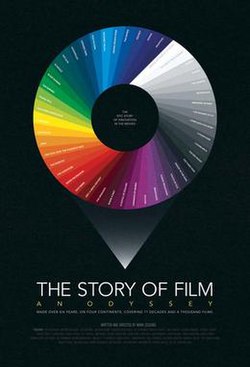
All of which is preamble to a review of this remarkable documentary 'The Story of Film' directed and narrated by the Northern Irish film critic Mark Cousins, which contains 15 one-hour chapters - a total length of 900 minutes. - available in a box set of 5 DVDs. First broadcast on More4 in September 2011, this is essential viewing for cineastes, film students, geeks and aficianados,
What makes it good? Firstly Cousins has literally traveled through space and time, beginning with Edison and Lumiere and bringing us right through to our era of digital cinema. He films in America, Europe, Asia, Russia, Latin America and takes us to
the actual studios and rooms where some of the greatest films ever made were conceived and produced. Of course many of the well-known names are there - D.W. Griffith, Kubrick, Jean-Luc Goddard - and there are some great original interviews with the likes of Lars von Trier, Bertolucci, Robert Towne and Jane Campion.
But then there are so many others that I was previously unaware of or ignorant of their work - the Danish filmmaker Carl Theodore Dreyer and the Japanese director Yasujiro Ozu are two good examples. In all cases, Cousins selects intense and interesting excerpts that provide stunning vignettes, whetting one's appetite for a whole ocean of films as yet unseen.
Cousins is also at pains to talk about technology and about cinema techniques, explaining how the medium has evolved. He has add energy to the films by interspersing all this with camera-eye view rides in cars, trains, buses in different cities around the world. It all repays repeated viewing.
*
One person who doesn't appear in 'The Story of Film' is currently my favourite director: Nuri Bilge Ceylan, one of the world's great filmmakers.
I began with his famous film 'Once Upon A Time in Anatolia' (2011) that won the Palm D'Or at Cannes and am currently working my way through the rest of his ouevre: his later film 'Winter Sleep' (2014) and two other prize winners 'Three Monkeys' (2008) [Best Director at Canne], Climates (2006) [Firesci prize, Cannes] and 'Distant' (2003) [Grand Prix and Best actor at Cannes] which was when he first came to international prominence. In all it received 47 awards (23 of them international) making it the most award-winning film in the history of Turkish cinema.
'Distant' (Uzak in Turkish] was the third film of a 'provincial trilogy', preceded by Clouds of May (2000) and The Small Town (1998). His very first short film Cocoon (1995) was an 'official selection' at Cannes. In his on-line bio it says: 'In all of these [early] films, Ceylan enlisted his close friends, relatives and family as actors and took on just about every technical role himself: the cinematography, sound design, production, editing, writing and direction...:'
'Climates' lead roles are shared by Nuri Bilge and his wife Ebru Ceylan. At the end of 2003, in the course of location scouting for that film, Nuri Bilge returned to photography for the first time since military service. From this point on, he began devoting his time to both cinema and photography.
What is it about these films that makes them so great. Ceylan has a wonderful eye and in all his films you are able to contemplate and enjoy the beauty of the landscapes (always central, even dominant, like an extra character) and faces (eyes in particular). He goes in close and holds. The pace of the films allows time for contemplation. The characters speak but much of what they communicate in the shots, that are held for a long time, where you can see that the person is thinking things through, conveyed only by subtle changes of expression. The stories are as deep as a Russian novel, have complex twists and turns and they ensnare you and your feelings.
Children riding bicycles, Midyat, 2004 [From his exhibition Turkey Cinemascope]
Needless to say, Ceylan is a crack photographer. There are two lovely videos of openings of his photoshow in Istanbul and Berlin. They are panoramas, blown up to some considerable size, the images heightened and enhanced by magic processes. Enjoy.
https://vimeo.com/113896904
http://www.museumbuzzy.com/nuri-bilge-ceylan-ny/
Ceylan's Official website: http://www.nbcfilm.com/
No comments:
Post a Comment